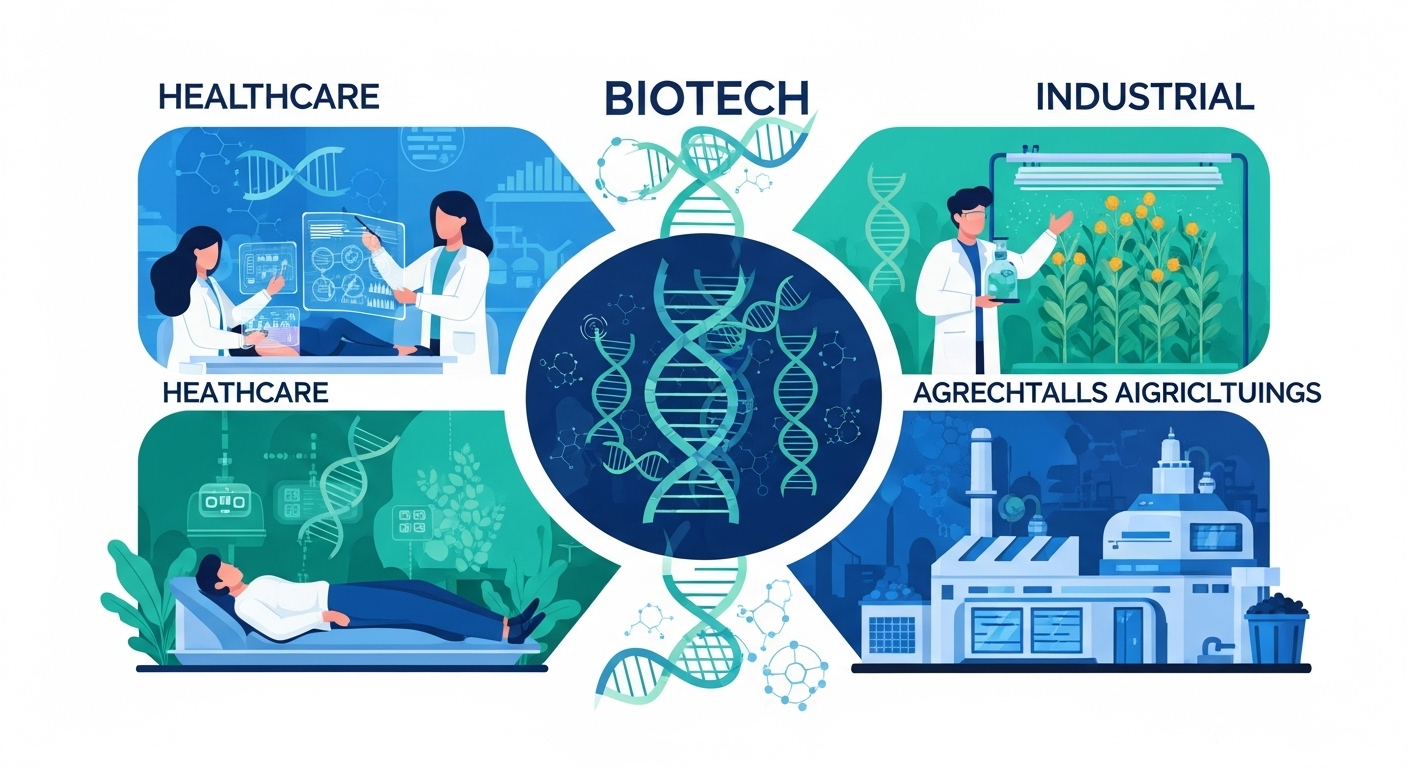So, you’ve been hearing about biotech everywhere, yeah? It’s like this buzzword that’s just not going away. And for good reason. Biotech, or biotechnology, is making waves in all sorts of areas. From healthcare to agriculture, even manufacturing. It’s got its fingers in a lot of pies. But what’s really going on here? Let’s dive into it.
What Exactly is Biotechnology?
Okay, so imagine mixing biology with technology. That’s basically the essence of biotech. According to Wikipedia, it involves using living systems and organisms to develop or make products. But it’s not just test tubes and Petri dishes. We’re talking about a field that’s stretching its capabilities into some pretty mind-blowing territories. Think genetic engineering, cloning, and even the creation of synthetic life forms. Wild stuff, huh?
The Role of Biotech in Healthcare
When folks discuss biotech, healthcare is usually the first thing that comes to mind. And rightly so. It’s transforming the medical field in ways we only dreamt of before. Take personalized medicine, for instance. The idea that treatments could be tailored to fit individual genetic makeups is exhilarating. It’s like science fiction, but it’s happening. And, of course, there’s the development of vaccines, where biotech has played a vital role, especially in recent times.
The Revolution in Agriculture
Let’s not forget agriculture. Biotech is helping to create crops that are more resilient to pests and environmental conditions. Genetically modified organisms (GMOs), though controversial, have brought about higher yields and reduced the need for chemical pesticides. It’s a mixed bag, though. There are ethical concerns and debates about biodiversity. But you can’t deny the potential for addressing food security issues.
Industrial Applications of Biotechnology
Ever thought about how biotech is influencing industrial processes? Yeah, it’s not just about planting seeds or curing diseases. Industrial biotech is about using enzymes and microorganisms to make chemical reactions faster, cleaner, and more efficient. This approach can lead to more sustainable manufacturing processes, reducing our carbon footprint. That’s something we can all cheer for.
Emerging Trends and Innovations
Now, let’s talk about what’s new and shiny. In 2023, according to Forbes, biotech is on the brink of some serious breakthroughs. We’re looking at advancements in regenerative medicine, artificial intelligence, and even the creation of lab-grown meat. These aren’t just ideas on paper anymore. They’re happening. They’re real.
Investment Opportunities in Biotech
With all these developments, biotech presents some interesting investment opportunities. Investors are keenly watching this space. Why? Because the innovations are not just groundbreaking—they’re potentially lucrative. New startups and established companies alike are pushing boundaries, making it a space to watch for entrepreneurs and investors alike.
Challenges Facing the Biotech Industry
It’s not all sunshine and rainbows, though. The biotech field isn’t without its challenges. Regulatory hurdles, high research and development costs, and ethical debates can slow progress. Plus, there’s the ever-present risk of technology outpacing our understanding of its implications. It’s a delicate dance between innovation and regulation, with lots of potential pitfalls along the way.
Ethical Considerations
Ethics. A word that pops up every time we talk about biotech. Whether it’s genetic modifications or synthetic biology, the ethical questions are numerous. Who gets to decide what’s acceptable? And how do we ensure that these powerful technologies aren’t misused? These are ongoing debates, with many opinions and no easy answers.
Regulatory Challenges
Regulations can be a double-edged sword. Necessary for safety but often a barrier to innovation. Striking the right balance is key, and that’s a challenge that policymakers and industry leaders are continuously grappling with. The landscape is evolving, but it’s crucial that regulations keep pace with technological advancements.
How Biotech Impacts Our Daily Lives
So, is biotech impacting our daily lives? You bet. From the medicines we take to the food we eat, biotech is woven into the fabric of modern life. And it’s not just about the big things. Even on a micro-level, the impact is there. Consider mobile health apps—tools that, while not purely biotech, intersect significantly with it by providing platforms for healthcare innovation. For more insights on mobile innovations, check out this useful resource.
Biotech and the Environment
There’s also an environmental angle. Biotech is helping develop solutions for pollution control and waste management. By using biological processes, companies are finding ways to clean up oil spills and manage waste more effectively. It’s all about leveraging nature’s own processes to create more sustainable practices.
The Future of Biotech
What lies ahead? The future is as exciting as it is uncertain. We’re on the cusp of advances that could redefine life itself. But it’s also a future that demands caution, responsibility, and inclusivity. The conversations we have today will shape the biotech landscape of tomorrow. So, as we watch this space, it’s worth keeping both an open mind and a critical eye.
| Biotech Application | Impact |
|---|---|
| Healthcare | Personalized medicine, vaccine development |
| Agriculture | GMO crops, improved yields |
| Industrial | Sustainable manufacturing |
| Environmental | Pollution control, waste management |
FAQs
- Q: What’s the difference between biotech and traditional medicine?
A: Biotech often uses living organisms or systems for developing treatments, while traditional medicine might rely more on chemical processes. - Q: Are GMOs safe to eat?
A: Most scientific studies show GMOs are safe, but they remain controversial for some due to environmental and ethical concerns. - Q: How does biotech affect the economy?
A: It drives innovation, creates jobs, and attracts investment but also involves high costs and regulatory challenges. - Q: Can biotech help with climate change?
A: Yes, through sustainable practices and innovations in pollution control and waste management. - Q: What’s the most exciting future development in biotech?
A: Hard to say, but things like lab-grown meat and personalized medicine are pretty thrilling!
Biotech’s a field that’s always moving, always changing. And while it presents its share of challenges, the potential benefits are hard to ignore. So, here’s to keeping an eye on what comes next. It’s bound to be interesting.


